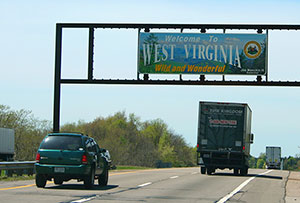West Virginia Senate Passes Tax, Fee Hikes for Highways

Legislation to increase highway funding in West Virginia by more than $290 million a year — primarily through increasing the state sales tax from 6% to 7% — is headed to the state’s House of Delegates that has proven adverse to tax hikes.
However, Mike Clowser, of the state Contractors Association and a member of Gov. Earl Ray Tomblin’s Blue Ribbon Commission on Highways, said March 2 that he’s hopeful the House will accept at least a portion of that increase to help fix the state’s deteriorating roads.
“Every House member I’ve talked to is serious about creating jobs, and they’re getting the same phone calls from constituents about the roads that the senators have gotten,” he said.
On March 2, the Senate passed the highways funding bill on a 25-9 vote without discussion.
As initially drafted, the bill would have increased the wholesale tax on gasoline by 3 cents a gallon during years when retail gas prices drop below $2 a gallon. That would raise about $30 million in those years, partially offsetting revenue losses when the wholesale tax automatically readjusts downward in years when gas prices are low.
However, the Senate on March 1 significantly amended the bill, adding the 1% sales tax, to raise about $200 million a year, along with increases in DMV fees — most of which have not changed since the 1970s — to raise $66 million a year, and a recalculation of the state privilege tax on vehicle sales, to raise $17 million a year.
“The strong vote in the Senate shows the Senate is serious about addressing highways problems and also serious about creating jobs,” Clowser said.
He said he anticipates debate in the House over whether to approve a 1% sales tax increase, consider some portion of that increase or come up with other funding options.
However, he said, “I think there is strong sentiment in both houses to walk out of here with a highways bill.”
Clowser added, “I think people have finally come to the realization that it’s going to cost money to build our roads and fix our roads.”
However, the West Virginia Center for Budget and Policy raised concerns March 2 that a 1% sales tax increase would hit low-income families disproportionately.
A 1% increase would take 0.6% of total income for households with incomes of $19,000 or less, compared with 0.3% of income for households with $91,000 incomes, the center found.
In 2015, the Blue Ribbon Commission on Highways, made up of legislators, state and local officials, industry and labor representatives, scholars and citizens, concluded that West Virginia needs to increase road funding by $750 million a year to adequately maintain its highways, and by an additional $350 million a year to complete road construction projects on the books. The $1.1 billion essentially would double current highways funding.
The panel proposed a number of fee increases, including hikes to DMV fees and privilege taxes similar to the proposed legislation. The centerpiece of the commission’s recommendations was a $1 billion bond issue to be paid off by extending tolls on the West Virginia Turnpike for an additional 30 years, a proposal that proved unpopular.

